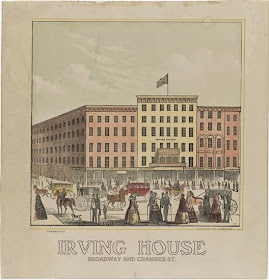 |
Irving House
– Broadway and Chambers Street
Engraved by Henry Bricher (b.circa 1817) - From
the Collections of the Museum of the City of New York
|
Men famous
in their time frequented the upstairs rooms at Chambers Street; their names
would constitute a “Who's Who” of New York in the Sixties and Seventies. Some
who are still remembered were Horace Greeley; Henry J Raymond of the Times; A.T. Stewart; James T Brady the courtroom spellbinder; William M Evarts, witty and learned
leader of the bar and future Secretary of State John Van Buren; Fernando Wood
the city's copperhead mayor who recommended that New York secede from the Union;
Astors and Vanderbilts in assorted lots; crusading clergymen like Henry Ward
Beecher and T. De Witt Talmadge, from conscience bound Brooklyn; Daniel Sickles,
a rake of marital and martial notoriety; Samuel J. Tilden near-President of the
United States; Chester A. Arthur, an actual though accidental President; Roscoe
Conkling the posturing “Adonis” senator and mastermind of New York republican
politics; and of course the potentates of the Tweed Ring, their aides and
abettors without number.
…Henry J.
Raymond, a politically active editor gave many dinners at Delmonico's Chambers
Street restaurant and mapped journalistic campaigns there. Room number 1
upstairs was the preserve of lawyers of whom the jovial Brady was a bellwether.
Whenever he chalked up another courtroom victory, it was his pleasure to
celebrate in room 1 with congenial spirits. human and liquid both fully
uncorked.
Rooms number 9 and 11 were consecrated to the politicians, Republican and Democratic, for there was no factionalism at Delmonico's. The unwritten rule was that the first party arriving could establish itself in number 11. and those coming later would convene in number 9. In this way next door to each other, the leaders of the opposite parties mapped their election strategies.
Rooms number 9 and 11 were consecrated to the politicians, Republican and Democratic, for there was no factionalism at Delmonico's. The unwritten rule was that the first party arriving could establish itself in number 11. and those coming later would convene in number 9. In this way next door to each other, the leaders of the opposite parties mapped their election strategies.
“…in 1855
when Lorenzo rented and fitted up the corner at Chambers Street and Broadway
which had formed part of the old Irving House; …Lorenzo Delmonico signed a
twenty one year lease of the property mentioned at an annual rental of $25,000
later raised to $30,000… Not everybody believed that Lorenzo was taking a rash
step. Hardly had he signed the lease when he was offered $75,000 for it; but the
renovations were under way, and he clung to the bargain.
The Irving House, on the
northwest corner of the intersection, had indeed earned a fortune for its
original proprietor. Built in 1848, it was the first in New York to boast of “bridal
suites,” and its furniture was reputed to have cost $150,000.
Lounging around
its entrance any day might be seen a cross section of the floating population
of the city - merchants in town on buying expeditions, Southerners smoking Havanas,
slouching Western men straight from the gold fields. Across Broadway rose the
six story marble “dry goods emporium” of A.T. Stewart, where the richness of
the stock startled visitors… ”
.
No comments:
Post a Comment